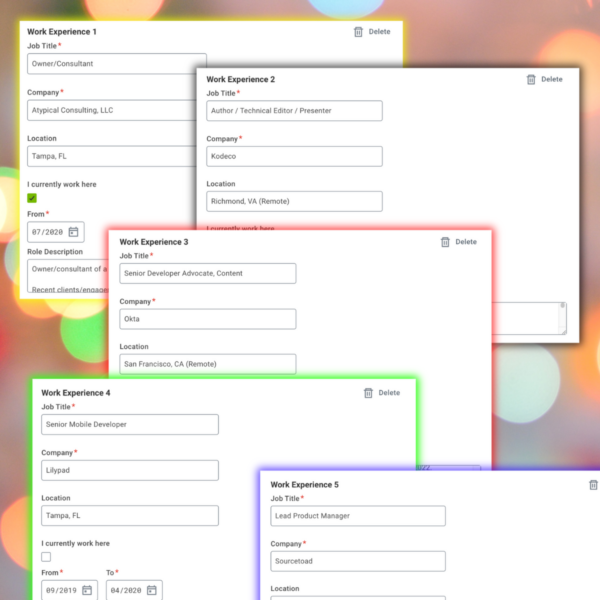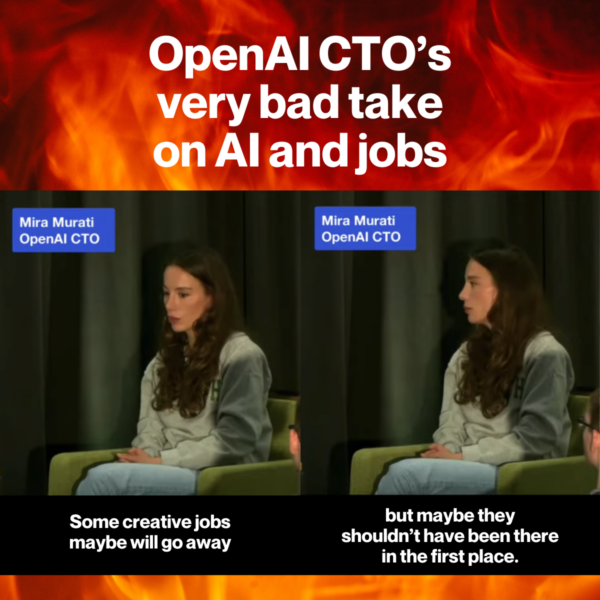The viewing angle might not be so great, but on the bright side, it’s really easy to reach the TV’s HDMI ports!
(Also: ChatGPT didn’t draw those images; its image-rendering counterpart DALL-E did.)

This is what my afternoon looks like. How’s yours going?

Some techies hold the attitude that “what I do is important, and what you do isn’t,” and the more socially savvy ones don’t say the quiet part out loud.
But Mira Murati, OpenAI’s CTO, did just that onstage at her alma mater, Dartmouth University, where she said this about AI displacing jobs in creative lines of work:
Some creative jobs maybe will go away, but maybe they shouldn’t have been there in the first place.
Mira Murati, from AI Everywhere: Transforming Our World, Empowering Humanity
(she says this around the 29:30 mark)
Here’s my take on her bad take, courtesy of the Global Nerdy YouTube channel, which you should subscribe to…
…and here’s the video with her full talk at Dartmouth:

Here’s the “official unofficial” list of tech, entrepreneur, and nerd events for Tampa Bay and surrounding areas for Monday, June 3 through Sunday, June 9, 2024.
And better yet, the course will be taught by an instructor I know and implicitly trust — me!
Here’s what the course will cover over its three days:
Find out more and register here!

Thursday evening at 5:30 p.m. at Kforce in Tampa: Tampa Devs and Tampa Java User Group jointly present Orchestrate the chaos: Process automation in modern architectures.
Their description of the event:
Complex business processes can be difficult to manage and automate. How do you quickly implement changes while maintaining uptime? How do you introduce a new service to an existing process? In this talk, we will discuss how to use Business Process Modeling (BPM) to orchestrate and execute complex business processes in your application. Don’t let the name fool you: this not your father’s Visio diagram. Everyone should leave this talk with a new approach to solving their orchestration complexities!
Find out more and register here.
How do I put this list together? It’s largely automated. I have a collection of Python scripts in a Jupyter Notebook that scrapes Meetup and Eventbrite for events in categories that I consider to be “tech,” “entrepreneur,” and “nerd.” The result is a checklist that I review. I make judgment calls and uncheck any items that I don’t think fit on this list.
In addition to events that my scripts find, I also manually add events when their organizers contact me with their details.
What goes into this list? I prefer to cast a wide net, so the list includes events that would be of interest to techies, nerds, and entrepreneurs. It includes (but isn’t limited to) events that fall under any of these categories:
The laws of time, effort, and experience make it very clear: I’m in the middle of making my worst videos right now, and you’ll want to subscribe to see how bad they are!
Come check out the awfulness on the Global Nerdy YouTube channel, located at youtube.com/@GlobalNerdy!
I’ve already posted the first two videos. The first is a short that looks at an odd paragraph in an O’Reilly article on AI…
…and the second is a blast from the past — a promotional video featuring images of a lot of top-tier developers, followed by an image that’s supposed to represent you, the everyday developer…and guess whose image they used:
There’ll be a mix of short- and long-form videos, where I’ll cover software development topics and technology news in interesting, unusual, and amusing ways.
I’m spending the month of June working on the first set of videos, which I’ll release as quickly as I can, so you know they’ll be bad. And if you’re thinking “But HOW bad?”, there’s only one way to find out: visit the channel and subscribe!

Here’s the “official unofficial” list of tech, entrepreneur, and nerd events for Tampa Bay and surrounding areas for Monday, June 3 through Sunday, June 9, 2024.
Saturday at University Mall: Gulf Coast MakerCon! Gulf Coast MakerCon provides an opportunity for everyone to join together to share resources, learn a craft, hone their skills, find career and academic opportunities, try new tools and innovations, and showcasing everyone’s amazing creativity! Find out more and register here.
How do I put this list together? It’s largely automated. I have a collection of Python scripts in a Jupyter Notebook that scrapes Meetup and Eventbrite for events in categories that I consider to be “tech,” “entrepreneur,” and “nerd.” The result is a checklist that I review. I make judgment calls and uncheck any items that I don’t think fit on this list.
In addition to events that my scripts find, I also manually add events when their organizers contact me with their details.
What goes into this list? I prefer to cast a wide net, so the list includes events that would be of interest to techies, nerds, and entrepreneurs. It includes (but isn’t limited to) events that fall under any of these categories: